Strategic Management Analysis of Google's EU Anti-Trust Law Breach
VerifiedAdded on 2023/04/06
|6
|1112
|155
Report
AI Summary
This report analyzes the European Commission's €4.34 billion fine imposed on Google for breaching EU anti-trust laws. It highlights Google's dominant position in the European Economic Area and its illegal restrictions on Android mobile network operators and device manufacturers. The analysis covers three main practices: illegal tying of Google's browser apps, illegal payment conditions for exclusive pre-installation of Google search, and illegal blockade of the development and distribution of competing Android operating systems. The report also discusses the implications of the fine, Google's strategic shift to mobile internet, and the company's vision and mission. It references various sources to support its analysis of the issue's strategic significance for Google.
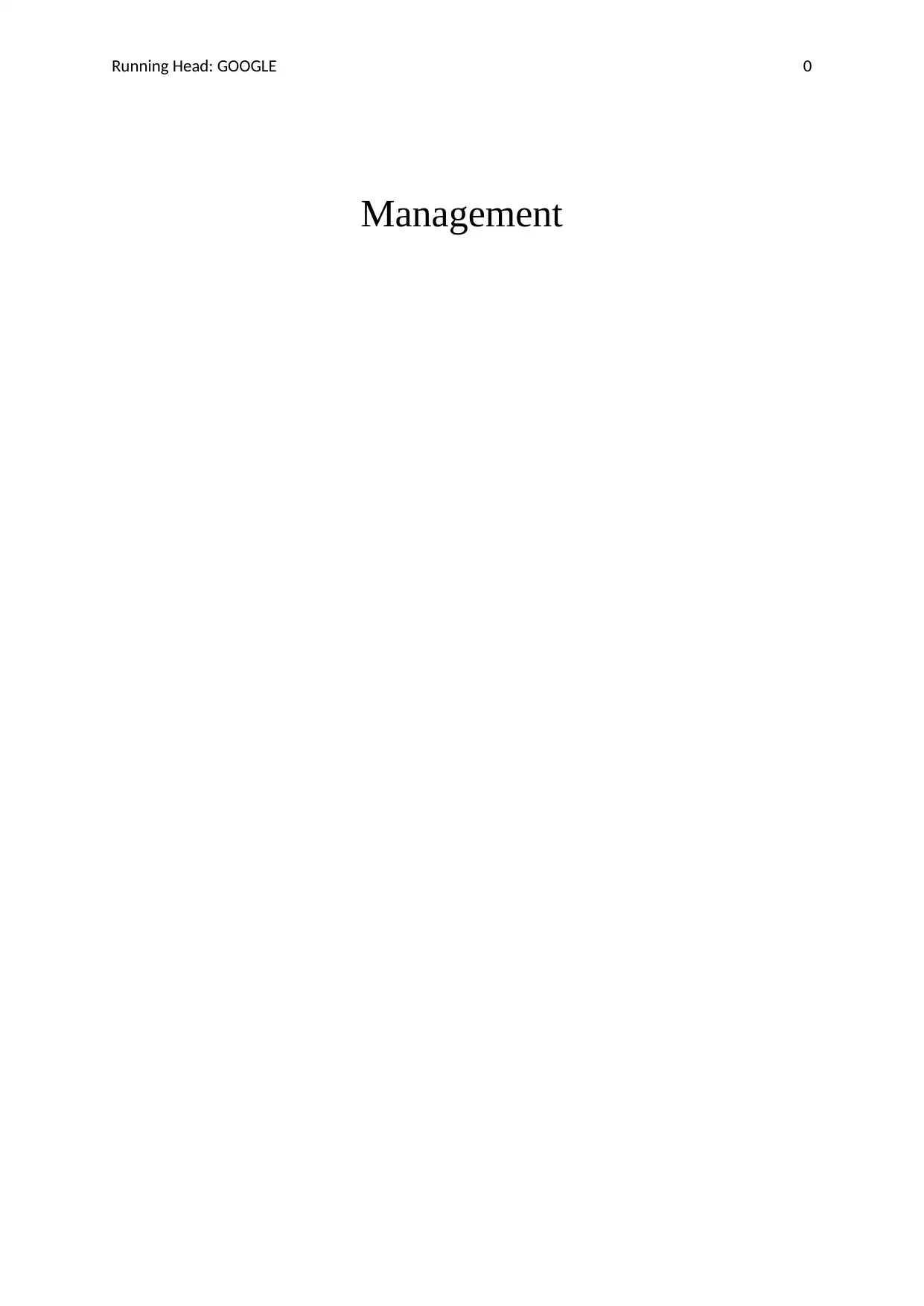
Running Head: GOOGLE 0
Management
Management
Paraphrase This Document
Need a fresh take? Get an instant paraphrase of this document with our AI Paraphraser
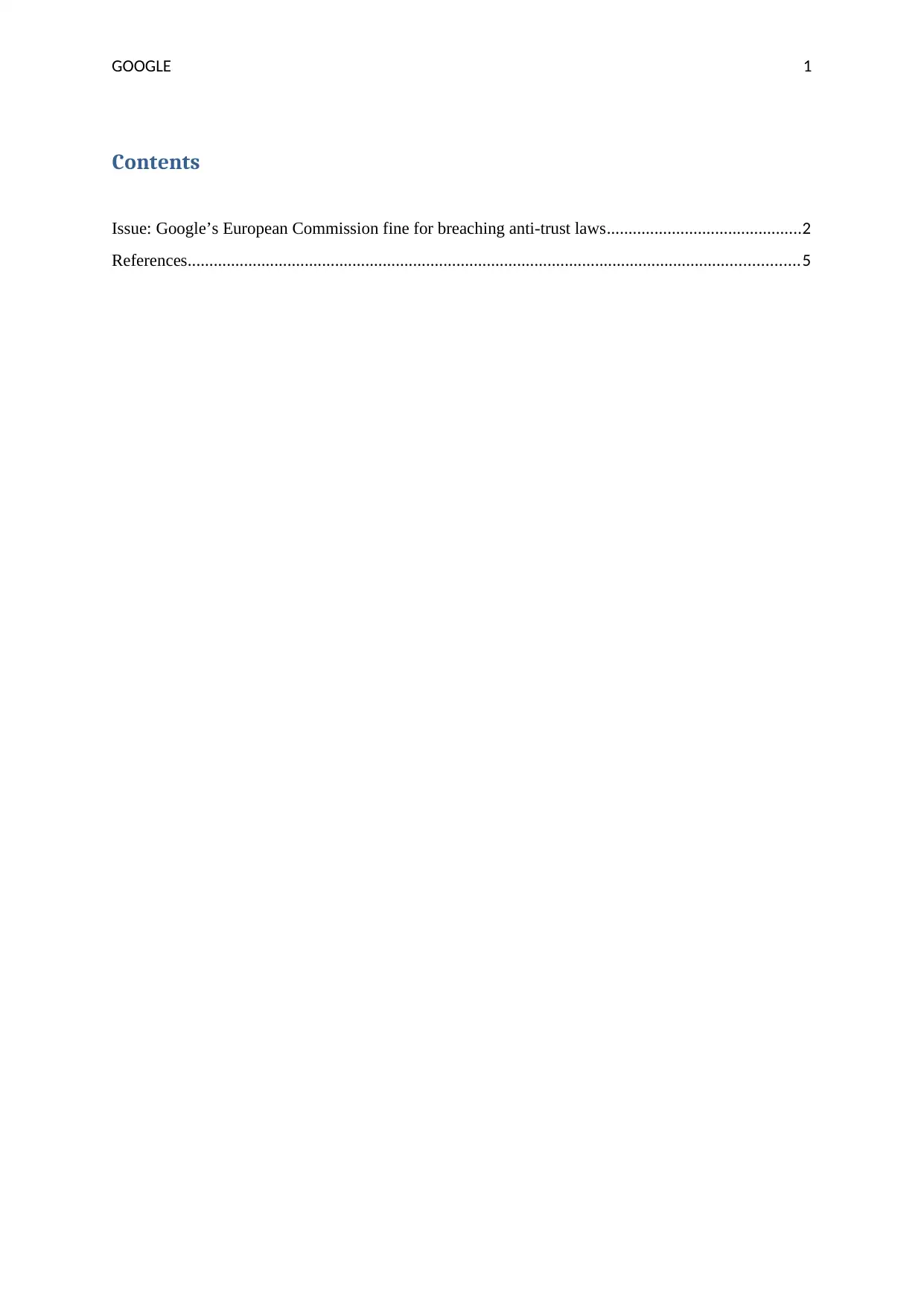
GOOGLE 1
Contents
Issue: Google’s European Commission fine for breaching anti-trust laws.............................................2
References.............................................................................................................................................5
Contents
Issue: Google’s European Commission fine for breaching anti-trust laws.............................................2
References.............................................................................................................................................5
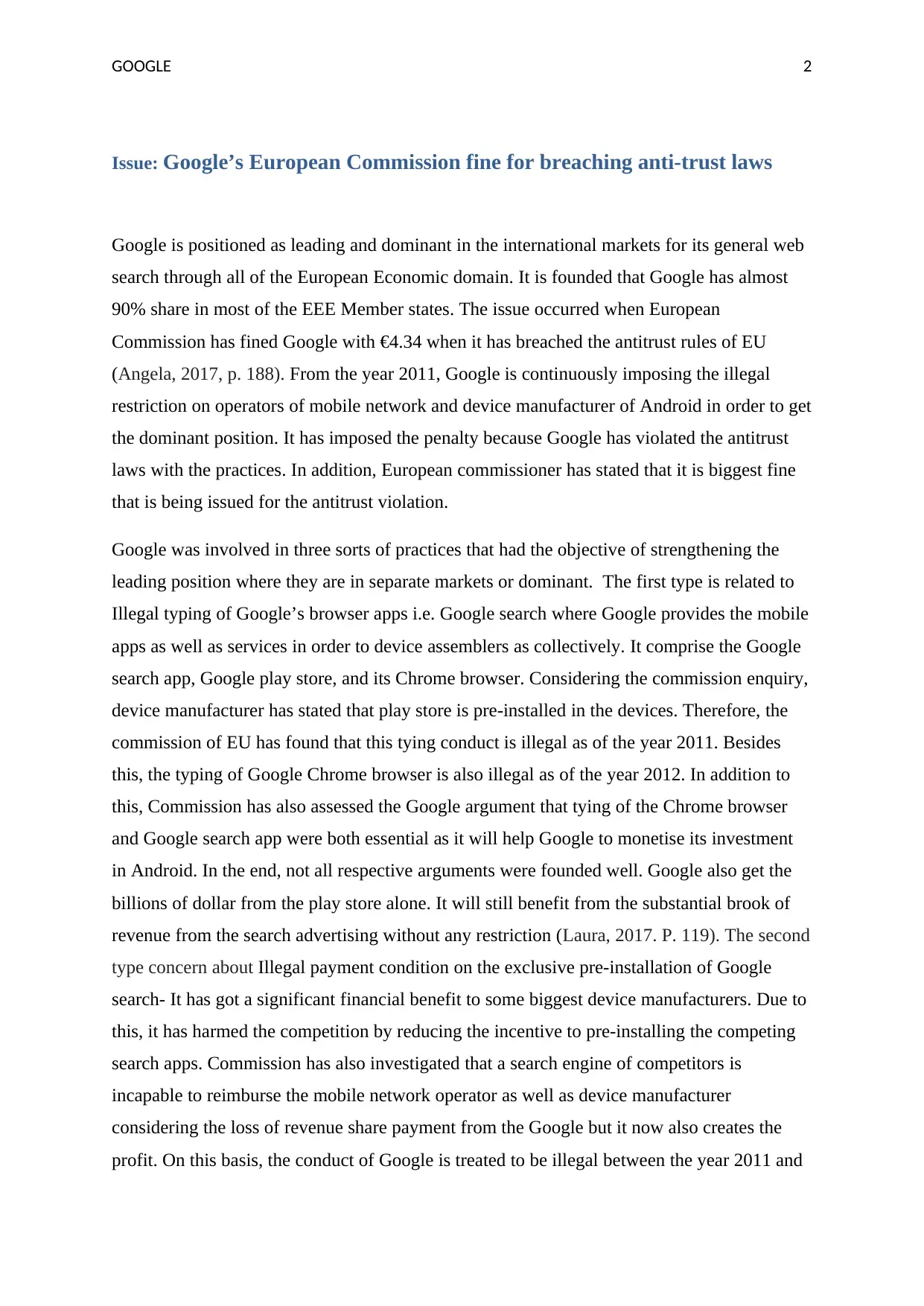
GOOGLE 2
Issue: Google’s European Commission fine for breaching anti-trust laws
Google is positioned as leading and dominant in the international markets for its general web
search through all of the European Economic domain. It is founded that Google has almost
90% share in most of the EEE Member states. The issue occurred when European
Commission has fined Google with €4.34 when it has breached the antitrust rules of EU
(Angela, 2017, p. 188). From the year 2011, Google is continuously imposing the illegal
restriction on operators of mobile network and device manufacturer of Android in order to get
the dominant position. It has imposed the penalty because Google has violated the antitrust
laws with the practices. In addition, European commissioner has stated that it is biggest fine
that is being issued for the antitrust violation.
Google was involved in three sorts of practices that had the objective of strengthening the
leading position where they are in separate markets or dominant. The first type is related to
Illegal typing of Google’s browser apps i.e. Google search where Google provides the mobile
apps as well as services in order to device assemblers as collectively. It comprise the Google
search app, Google play store, and its Chrome browser. Considering the commission enquiry,
device manufacturer has stated that play store is pre-installed in the devices. Therefore, the
commission of EU has found that this tying conduct is illegal as of the year 2011. Besides
this, the typing of Google Chrome browser is also illegal as of the year 2012. In addition to
this, Commission has also assessed the Google argument that tying of the Chrome browser
and Google search app were both essential as it will help Google to monetise its investment
in Android. In the end, not all respective arguments were founded well. Google also get the
billions of dollar from the play store alone. It will still benefit from the substantial brook of
revenue from the search advertising without any restriction (Laura, 2017. P. 119). The second
type concern about Illegal payment condition on the exclusive pre-installation of Google
search- It has got a significant financial benefit to some biggest device manufacturers. Due to
this, it has harmed the competition by reducing the incentive to pre-installing the competing
search apps. Commission has also investigated that a search engine of competitors is
incapable to reimburse the mobile network operator as well as device manufacturer
considering the loss of revenue share payment from the Google but it now also creates the
profit. On this basis, the conduct of Google is treated to be illegal between the year 2011 and
Issue: Google’s European Commission fine for breaching anti-trust laws
Google is positioned as leading and dominant in the international markets for its general web
search through all of the European Economic domain. It is founded that Google has almost
90% share in most of the EEE Member states. The issue occurred when European
Commission has fined Google with €4.34 when it has breached the antitrust rules of EU
(Angela, 2017, p. 188). From the year 2011, Google is continuously imposing the illegal
restriction on operators of mobile network and device manufacturer of Android in order to get
the dominant position. It has imposed the penalty because Google has violated the antitrust
laws with the practices. In addition, European commissioner has stated that it is biggest fine
that is being issued for the antitrust violation.
Google was involved in three sorts of practices that had the objective of strengthening the
leading position where they are in separate markets or dominant. The first type is related to
Illegal typing of Google’s browser apps i.e. Google search where Google provides the mobile
apps as well as services in order to device assemblers as collectively. It comprise the Google
search app, Google play store, and its Chrome browser. Considering the commission enquiry,
device manufacturer has stated that play store is pre-installed in the devices. Therefore, the
commission of EU has found that this tying conduct is illegal as of the year 2011. Besides
this, the typing of Google Chrome browser is also illegal as of the year 2012. In addition to
this, Commission has also assessed the Google argument that tying of the Chrome browser
and Google search app were both essential as it will help Google to monetise its investment
in Android. In the end, not all respective arguments were founded well. Google also get the
billions of dollar from the play store alone. It will still benefit from the substantial brook of
revenue from the search advertising without any restriction (Laura, 2017. P. 119). The second
type concern about Illegal payment condition on the exclusive pre-installation of Google
search- It has got a significant financial benefit to some biggest device manufacturers. Due to
this, it has harmed the competition by reducing the incentive to pre-installing the competing
search apps. Commission has also investigated that a search engine of competitors is
incapable to reimburse the mobile network operator as well as device manufacturer
considering the loss of revenue share payment from the Google but it now also creates the
profit. On this basis, the conduct of Google is treated to be illegal between the year 2011 and
⊘ This is a preview!⊘
Do you want full access?
Subscribe today to unlock all pages.

Trusted by 1+ million students worldwide
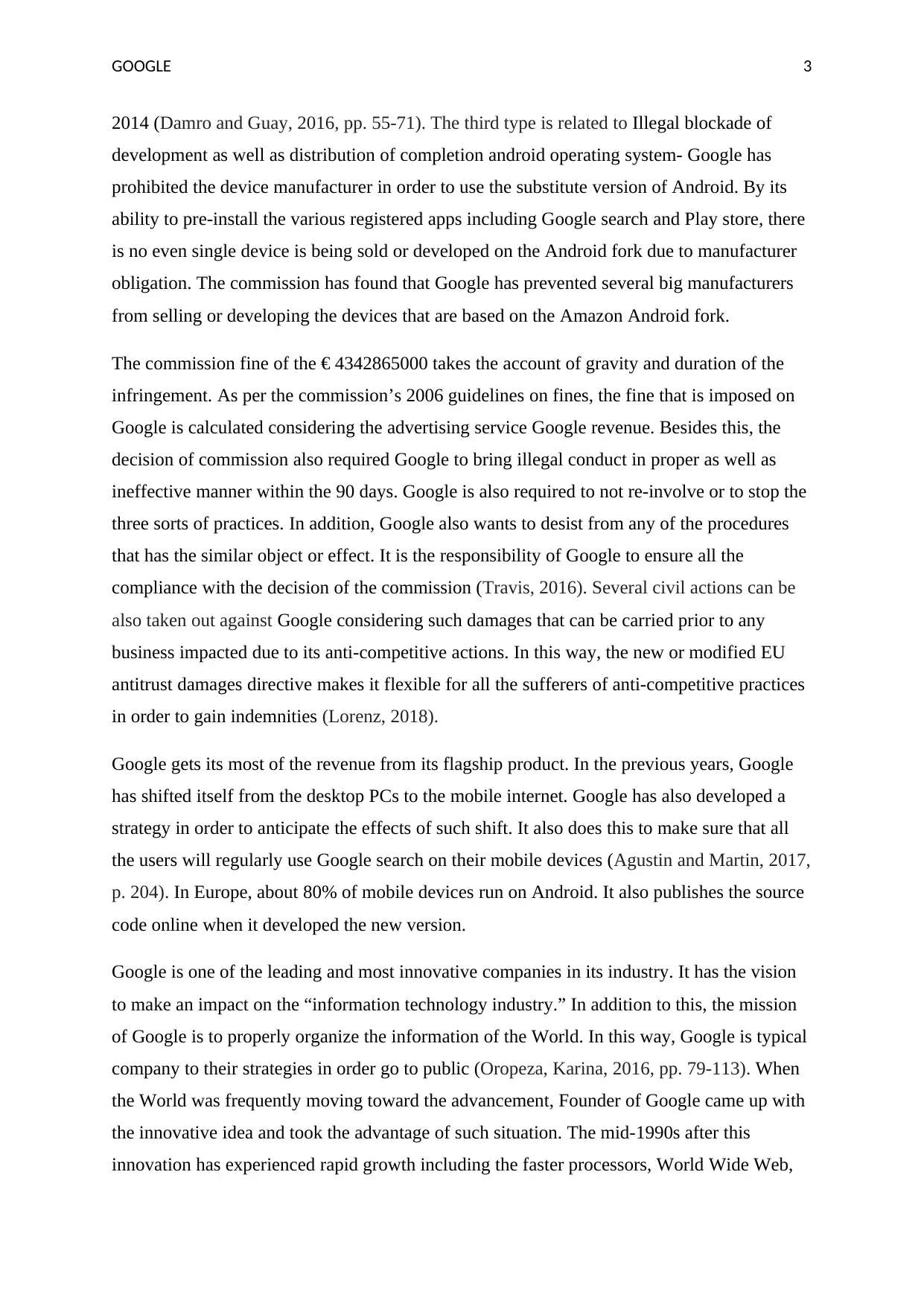
GOOGLE 3
2014 (Damro and Guay, 2016, pp. 55-71). The third type is related to Illegal blockade of
development as well as distribution of completion android operating system- Google has
prohibited the device manufacturer in order to use the substitute version of Android. By its
ability to pre-install the various registered apps including Google search and Play store, there
is no even single device is being sold or developed on the Android fork due to manufacturer
obligation. The commission has found that Google has prevented several big manufacturers
from selling or developing the devices that are based on the Amazon Android fork.
The commission fine of the € 4342865000 takes the account of gravity and duration of the
infringement. As per the commission’s 2006 guidelines on fines, the fine that is imposed on
Google is calculated considering the advertising service Google revenue. Besides this, the
decision of commission also required Google to bring illegal conduct in proper as well as
ineffective manner within the 90 days. Google is also required to not re-involve or to stop the
three sorts of practices. In addition, Google also wants to desist from any of the procedures
that has the similar object or effect. It is the responsibility of Google to ensure all the
compliance with the decision of the commission (Travis, 2016). Several civil actions can be
also taken out against Google considering such damages that can be carried prior to any
business impacted due to its anti-competitive actions. In this way, the new or modified EU
antitrust damages directive makes it flexible for all the sufferers of anti-competitive practices
in order to gain indemnities (Lorenz, 2018).
Google gets its most of the revenue from its flagship product. In the previous years, Google
has shifted itself from the desktop PCs to the mobile internet. Google has also developed a
strategy in order to anticipate the effects of such shift. It also does this to make sure that all
the users will regularly use Google search on their mobile devices (Agustin and Martin, 2017,
p. 204). In Europe, about 80% of mobile devices run on Android. It also publishes the source
code online when it developed the new version.
Google is one of the leading and most innovative companies in its industry. It has the vision
to make an impact on the “information technology industry.” In addition to this, the mission
of Google is to properly organize the information of the World. In this way, Google is typical
company to their strategies in order go to public (Oropeza, Karina, 2016, pp. 79-113). When
the World was frequently moving toward the advancement, Founder of Google came up with
the innovative idea and took the advantage of such situation. The mid-1990s after this
innovation has experienced rapid growth including the faster processors, World Wide Web,
2014 (Damro and Guay, 2016, pp. 55-71). The third type is related to Illegal blockade of
development as well as distribution of completion android operating system- Google has
prohibited the device manufacturer in order to use the substitute version of Android. By its
ability to pre-install the various registered apps including Google search and Play store, there
is no even single device is being sold or developed on the Android fork due to manufacturer
obligation. The commission has found that Google has prevented several big manufacturers
from selling or developing the devices that are based on the Amazon Android fork.
The commission fine of the € 4342865000 takes the account of gravity and duration of the
infringement. As per the commission’s 2006 guidelines on fines, the fine that is imposed on
Google is calculated considering the advertising service Google revenue. Besides this, the
decision of commission also required Google to bring illegal conduct in proper as well as
ineffective manner within the 90 days. Google is also required to not re-involve or to stop the
three sorts of practices. In addition, Google also wants to desist from any of the procedures
that has the similar object or effect. It is the responsibility of Google to ensure all the
compliance with the decision of the commission (Travis, 2016). Several civil actions can be
also taken out against Google considering such damages that can be carried prior to any
business impacted due to its anti-competitive actions. In this way, the new or modified EU
antitrust damages directive makes it flexible for all the sufferers of anti-competitive practices
in order to gain indemnities (Lorenz, 2018).
Google gets its most of the revenue from its flagship product. In the previous years, Google
has shifted itself from the desktop PCs to the mobile internet. Google has also developed a
strategy in order to anticipate the effects of such shift. It also does this to make sure that all
the users will regularly use Google search on their mobile devices (Agustin and Martin, 2017,
p. 204). In Europe, about 80% of mobile devices run on Android. It also publishes the source
code online when it developed the new version.
Google is one of the leading and most innovative companies in its industry. It has the vision
to make an impact on the “information technology industry.” In addition to this, the mission
of Google is to properly organize the information of the World. In this way, Google is typical
company to their strategies in order go to public (Oropeza, Karina, 2016, pp. 79-113). When
the World was frequently moving toward the advancement, Founder of Google came up with
the innovative idea and took the advantage of such situation. The mid-1990s after this
innovation has experienced rapid growth including the faster processors, World Wide Web,
Paraphrase This Document
Need a fresh take? Get an instant paraphrase of this document with our AI Paraphraser

GOOGLE 4
upgraded memory, more storage, accelerated graphics cards, as well as user-friendly
operating systems.
upgraded memory, more storage, accelerated graphics cards, as well as user-friendly
operating systems.
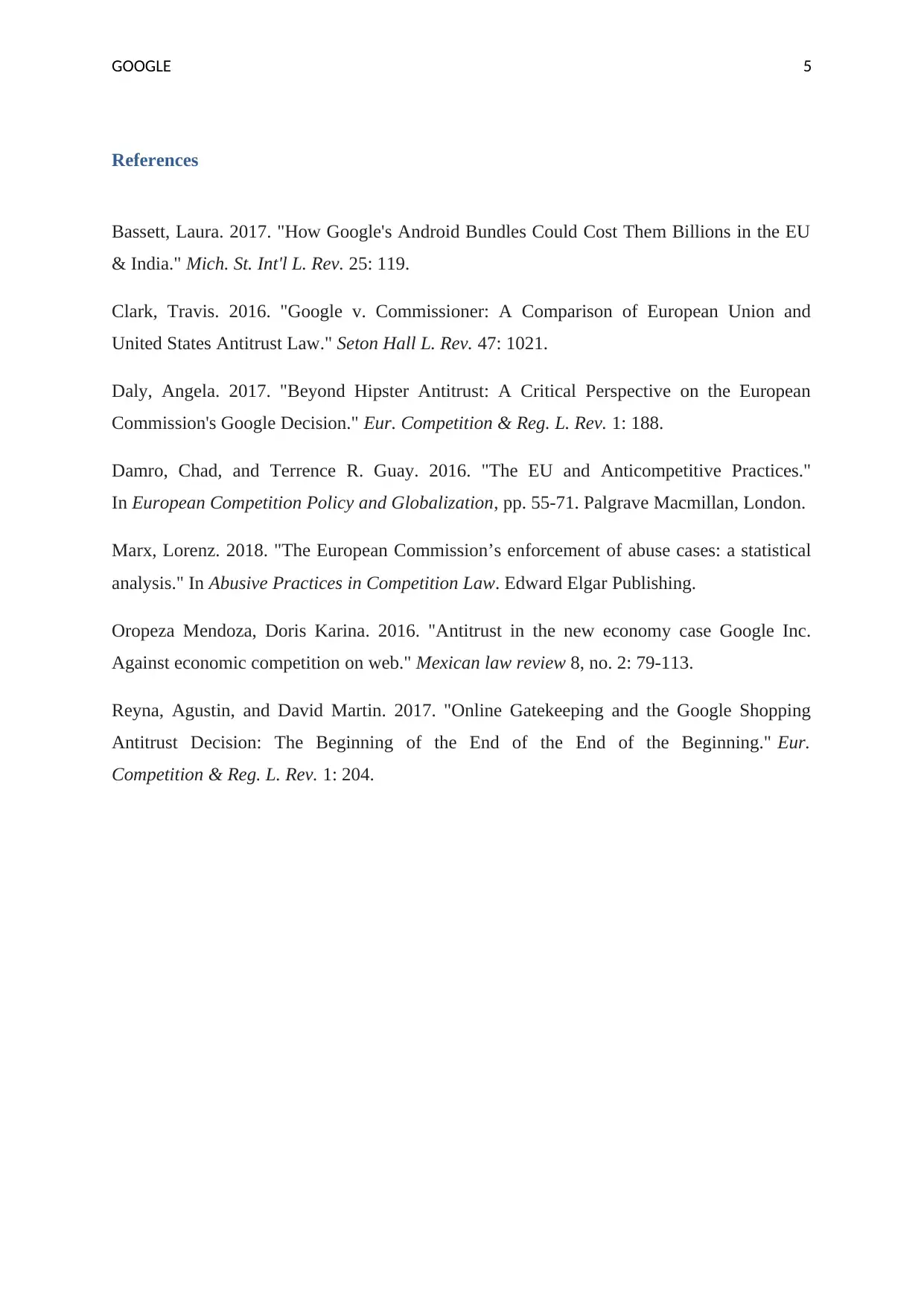
GOOGLE 5
References
Bassett, Laura. 2017. "How Google's Android Bundles Could Cost Them Billions in the EU
& India." Mich. St. Int'l L. Rev. 25: 119.
Clark, Travis. 2016. "Google v. Commissioner: A Comparison of European Union and
United States Antitrust Law." Seton Hall L. Rev. 47: 1021.
Daly, Angela. 2017. "Beyond Hipster Antitrust: A Critical Perspective on the European
Commission's Google Decision." Eur. Competition & Reg. L. Rev. 1: 188.
Damro, Chad, and Terrence R. Guay. 2016. "The EU and Anticompetitive Practices."
In European Competition Policy and Globalization, pp. 55-71. Palgrave Macmillan, London.
Marx, Lorenz. 2018. "The European Commission’s enforcement of abuse cases: a statistical
analysis." In Abusive Practices in Competition Law. Edward Elgar Publishing.
Oropeza Mendoza, Doris Karina. 2016. "Antitrust in the new economy case Google Inc.
Against economic competition on web." Mexican law review 8, no. 2: 79-113.
Reyna, Agustin, and David Martin. 2017. "Online Gatekeeping and the Google Shopping
Antitrust Decision: The Beginning of the End of the End of the Beginning." Eur.
Competition & Reg. L. Rev. 1: 204.
References
Bassett, Laura. 2017. "How Google's Android Bundles Could Cost Them Billions in the EU
& India." Mich. St. Int'l L. Rev. 25: 119.
Clark, Travis. 2016. "Google v. Commissioner: A Comparison of European Union and
United States Antitrust Law." Seton Hall L. Rev. 47: 1021.
Daly, Angela. 2017. "Beyond Hipster Antitrust: A Critical Perspective on the European
Commission's Google Decision." Eur. Competition & Reg. L. Rev. 1: 188.
Damro, Chad, and Terrence R. Guay. 2016. "The EU and Anticompetitive Practices."
In European Competition Policy and Globalization, pp. 55-71. Palgrave Macmillan, London.
Marx, Lorenz. 2018. "The European Commission’s enforcement of abuse cases: a statistical
analysis." In Abusive Practices in Competition Law. Edward Elgar Publishing.
Oropeza Mendoza, Doris Karina. 2016. "Antitrust in the new economy case Google Inc.
Against economic competition on web." Mexican law review 8, no. 2: 79-113.
Reyna, Agustin, and David Martin. 2017. "Online Gatekeeping and the Google Shopping
Antitrust Decision: The Beginning of the End of the End of the Beginning." Eur.
Competition & Reg. L. Rev. 1: 204.
⊘ This is a preview!⊘
Do you want full access?
Subscribe today to unlock all pages.

Trusted by 1+ million students worldwide
1 out of 6
Your All-in-One AI-Powered Toolkit for Academic Success.
+13062052269
info@desklib.com
Available 24*7 on WhatsApp / Email
![[object Object]](/_next/static/media/star-bottom.7253800d.svg)
Unlock your academic potential
Copyright © 2020–2026 A2Z Services. All Rights Reserved. Developed and managed by ZUCOL.
